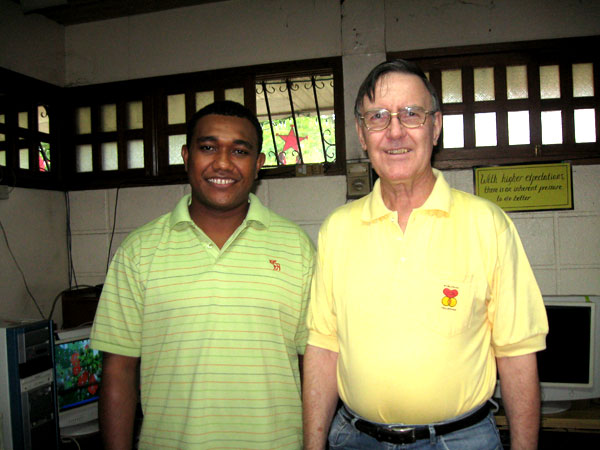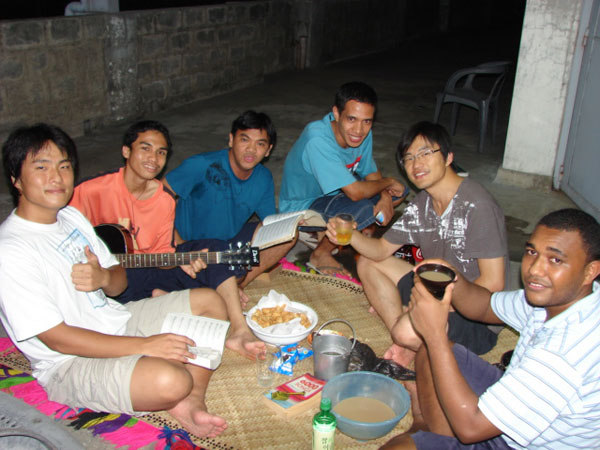Fiji Day Celebrations In The Philippines
By Etuate Tubuka
Etuate, known as ‘Etu’, is Columban seminarian from Fiji studying in Quezon City.
I woke up in the morning of Saturday 11 October last year with a feeling of great delight and cheerfulness for it was the day we Fijians here in the Philippines were going to celebrate Fiji’s Independence from Great Britain. The actual date of independence is 10 October but since it fell on Friday, a working day, we decided to have the celebration the following day.
Exactly 134 years earlier Fiji was ceded to Great Britain due to unpaid debts to some Americans. Fijians then were living under the traditional chiefly system and money was of no value. People were tricked into the barter system where land could be exchanged for an axe or a bottle of whiskey. Settlers from Europe, America and Asia combed the Fijian shores and the trace of their blood still lingers in the Fijian population. At this time, a Fijian chief by the name of Seru Cakobau declared himself to be King of Fiji without consulting all the other chiefs. This was quite astonishing because chiefs were only respected in their own province or ‘vanua’ (in Fijian terms) and if someone crossed boundaries it meant war.

Etu with the Misyon Editor, Fr Sean Coyle
It was during this time that the house of Cakobau’s ally, an American, was razed to the ground. Cakobau was blamed for the fire and the looting that came with it. There was nothing he could do since he did not have money and the only solution was to seek help from another country. Therefore, on 10 October 1874 Cakobau and other chiefs of Fiji with heavy and sorrowful hearts signed the deed of secession to Great Britain and Fiji became a British Colony.
Thirty-nine years ago another deed was signed but with celebrations and joy. At 10 o’clock on the 10 October 1970 Fiji became known to the world as the Republic of the Fiji Islands.
38 years later we Fijian Columbans in the Philippines were handing out invitations to the Columban community here as well as to other Fijians and Pacific Islanders. The venue of the fiesta was the Columban House of Studies whose turn it was to host the community night as well as to show off their new basketball court with floodlights in which the entertainment was to be held.
The celebration began with Mass at 5pm in English and the liturgy was led by the Fijians with the help of ‘The Boys of 42’ (the Columban seminarians from 42 Rosario Drive, Cubao, QC). The main celebrant was Columban Father Vincent Ratnam, a Fijian, and he reminded the congregation of the importance of joy in life. The gospel that weekend was about a wedding feast and Father Vincent connected it to the theme and celebration of the day.
After Mass a traditional ‘kava’ (a Fijian traditional drink) ceremony of welcome was conducted. This was done to formally accept and welcome visitors and to show that we, the hosts, had no feelings of resentment towards them and at the same time we were asking God to protect them during their stay.
The highlight of the evening was the entertainment. While some were taking part in the dancing and clapping, others did the watching and laughing. For one hour everyone in their different colors danced to the Pacific beat until dinner was served.
Dinner was cooked in a lovo (earth oven), a traditional Fijian way of cooking in which the food is cooked by the steam of hot stones. Anything can be cooked in a lovo and in this case it was chicken, pork, fish, potatoes, cassava and palusami (taro leaves in coconut milk). Our cook produced some Filipino dishes and the Columban lay missionaries displayed their creativity with a touch of Indian cuisine. Thus everyone enjoyed a banquet fit for a king.
Everyone dispersed after dinner, happy, excited and fulfilled after a complete and lovely evening which all enjoyed. The Fijians continued their celebration with more kava and singing late into the night which brought back memories of home. It was a night to remember; I felt proud to be a Fijian.
You may email Etu at etubuka@gmail.com or write him at: Columban House of Studies, PO Box 4454, 1099 MANILA.

Kava Session
Yaqona or Kava Drinking
Yaqona, (pronounced ‘yangGOna’) otherwise known as kava, is an infusion prepared from the root of Piper methysticum, a type of pepper plant. It is extremely important in Fijian culture - in the time of the 'old religion' it was used ceremonially by chiefs and priests only. Today, yaqona is part of daily life, not only in villages but across the different races and in urban areas. 'Having a grog' is used for welcoming and bonding with visitors, for storytelling sessions or merely for passing time.There are certain protocols to be followed at a kava ceremony and in some remote villages, it is still a semireligious experience. Sit cross-legged, facing the chief and the tanoa, or large wooden bowl. Women usually sit behind the men and won't get offered the first drink unless they are the guest of honour. Never walk across the circle of participants, turn your back to the tanoa or step over the cord that leads from the tanoa to a white cowry (it represents a link with the spirits).
The drink is prepared in the tanoa. The dried and powdered root, wrapped in a piece of cloth, is mixed with water and the resulting concoction looks (and tastes) like muddy water. You will then be offered a drink from a bilo (half a coconut shell). Clap once, accept the bilo and say 'bula' (meaning 'cheers', or literally, 'life'), before drinking it all in one go. Clap three times in gratification and try not to grimace. The drink will be shared until the tanoa is empty. You are not obligated to drink every bilo offered to you, but it is polite to drink at least the first.
(Source: http://www.fiji.gov.fj/publish/history_culture.shtml )
